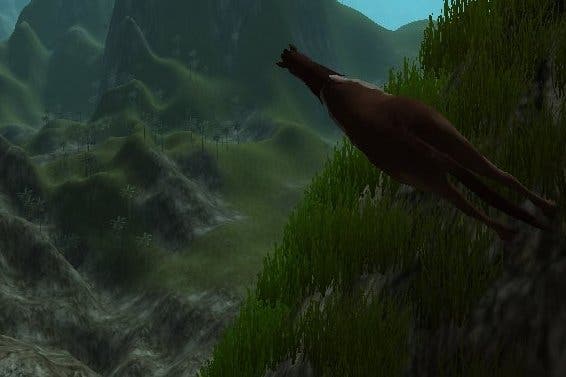Forget E3 press conferences, sometimes Cliffhorse is all you need
Just watch those Dogecoins rolling in.
Cliffhorse is fun for five minutes or so but - for a certain strain of its audience - it must be troubling for a whole lot longer. To elaborate: on Saturday, Markus 'Notch' Persson released a game that had taken him about two hours to knock up using the Unity engine. Then yesterday, Sony and Microsoft - and Ubisoft and EA - spent millions of dollars renting auditoria, giant screens, and often weird light-up wristbands to get the news of their new games to the world. They flew developers around the planet to appear on stage in LA and splashed out, in some cases, on Hollywood talent to really drive the point home. Notch? Two hours. Unity. A game about a horse pushing a marble about. And yet when Sony and Microsoft reached the technology page of the BBC News website, Notch and Cliffhorse were there too.
It's not about the money with Notch, of course. He's already rich, for one thing, and besides, Cliffhorse can only be paid for with Dogecoin, a kind of digital currency that I'd barely heard of before yesterday. He's made a little bit of cash out of it, but most people are going to download Cliffhorse for free - and it seems, in fact, that the whole thing is a bit of a joke anyway, aimed at the Early Access crowd who get people paying for rough-sketch games that may never get finished. Forget all of that for now. A lot of what's interesting about Cliffhorse is the very fact that mainstream media felt the need to write about its existence, despite its creator sidestepping a lot of the things the games industry often feels it has to do to win the attention of mainstream media in the first place. Sites like the BBC wrote about Cliffhorse because Notch made it, and Notch is sufficiently interesting as a creative person that anything he does is now deemed interesting too. You know, like Steven Spielberg, or Donna Tartt.
Notch is in exactly the position that Sony and Microsoft would like to be in, in other words, and he got there in an unusual way - not through hype and press releases and appearing on stage in a leather jacket and cargo pants to talk about his vision, but by creating a compulsive toy, letting people buy into its development, and then making sure it blossomed into the game that his growing audience wanted. Maybe you couldn't repeat that, but you probably couldn't repeat what Spielberg did either.
And now? Now he's Notch. I played Cliffhorse for the same reason I'll watch a trailer to the new Spielberg, or read all the reviews of Tartt's latest book. When I sat down with Cliffhorse, in fact - just to reiterate, you're a horse stuck in the middle of some mountains kicking a ball to and fro - I actually found myself wondering just why I was enjoying it so much. Was it sufficiently simple and mindless and quirky to keep me playing, or was I responding to the intangible aura of the man who made it? This question - of the additional qualities an artwork inherits from its creator - has been bothering people since the days of Walter Benjamin. We've never really had to worry about it with games all that often, of course, because for many games made over the last 30 years, the people who have made them have not really become a part of the story.
Cliffhorse, then, joke that it is, is yet another sign that games are changing. Even when they're intentionally stupid and limited and when they've been hacked together in a few hours, they may still have the ability to reach new audiences and for new reasons. Those glitzy E3 press conferences aren't going away anytime soon, perhaps, but the people paying for them must be looking at the star power of people like Notch with envy - and not just because he has Dogecoins clinking in his virtual pocket.




-3-31-23-screenshot.png?width=291&height=164&fit=crop&quality=80&format=jpg&auto=webp)





